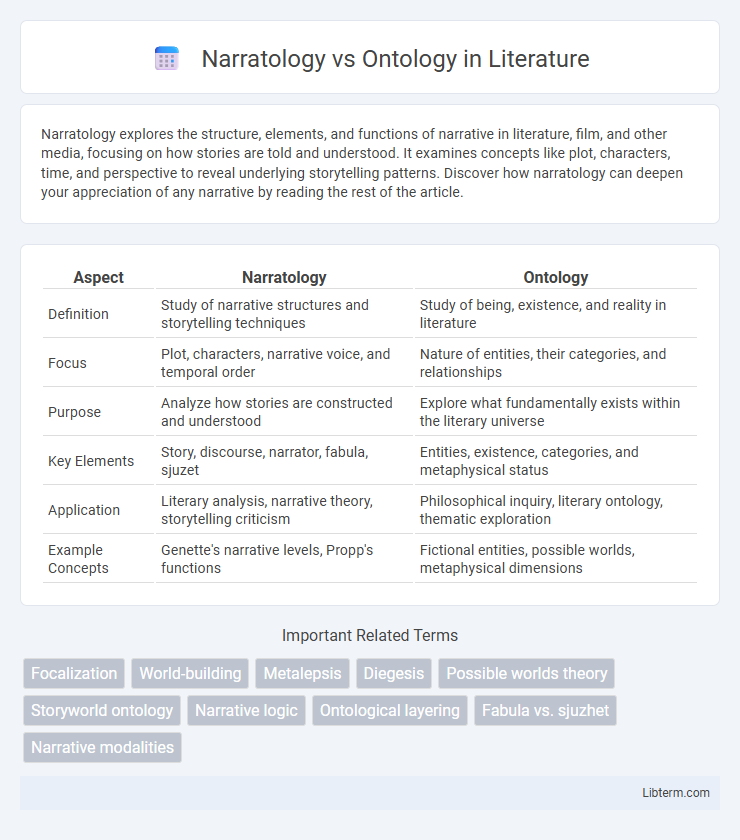Narratology explores the structure, elements, and functions of narrative in literature, film, and other media, focusing on how stories are told and understood. It examines concepts like plot, characters, time, and perspective to reveal underlying storytelling patterns. Discover how narratology can deepen your appreciation of any narrative by reading the rest of the article.
Table of Comparison
| Aspect | Narratology | Ontology |
|---|---|---|
| Definition | Study of narrative structures and storytelling techniques | Study of being, existence, and reality in literature |
| Focus | Plot, characters, narrative voice, and temporal order | Nature of entities, their categories, and relationships |
| Purpose | Analyze how stories are constructed and understood | Explore what fundamentally exists within the literary universe |
| Key Elements | Story, discourse, narrator, fabula, sjuzet | Entities, existence, categories, and metaphysical status |
| Application | Literary analysis, narrative theory, storytelling criticism | Philosophical inquiry, literary ontology, thematic exploration |
| Example Concepts | Genette's narrative levels, Propp's functions | Fictional entities, possible worlds, metaphysical dimensions |
Defining Narratology: The Study of Narrative Structure
Narratology is the systematic study of narrative structures, focusing on how stories are constructed and understood across different mediums. It analyzes components such as plot, time, character, and narrative voice to uncover underlying patterns and frameworks that shape storytelling. Unlike ontology, which explores the nature of being and existence, narratology specifically examines the mechanics and functions of narrative forms in literature, film, and other narrative arts.
Understanding Ontology: The Nature of Being and Reality
Ontology explores the fundamental nature of being, existence, and reality, examining what entities exist and how they can be categorized. It provides a framework for understanding how different forms of being relate to each other and to the nature of existence itself. This philosophical discipline contrasts with narratology, which focuses on the structure and function of narrative rather than the essence of being.
Historical Evolution of Narratology and Ontology
Narratology emerged in the 20th century as a distinct field focused on the structures and functions of narrative, influenced by structuralism and semiotics, with significant contributions from scholars like Gerard Genette and Roland Barthes. Ontology, rooted in ancient philosophy through thinkers such as Aristotle and continuing through medieval scholastics to contemporary analytic philosophy, centers on the nature of being and existence, investigating categories and relationships of entities. The historical evolution of narratology mirrors shifts from formalist literary analysis to interdisciplinary approaches, while ontology has progressively expanded from metaphysical inquiries to include diverse applications in information science and artificial intelligence.
Key Theorists in Narratology and Ontology
Key theorists in narratology include Gerard Genette, known for his work on narrative discourse and the structure of narratives, and Mieke Bal, who emphasized the cultural and ideological dimensions of storytelling. In ontology, influential figures such as Martin Heidegger and Aristotle shaped foundational concepts about the nature of being and existence, with Heidegger exploring the human experience of being and Aristotle categorizing different modes of being. The intersection of narratology and ontology often examines how narrative structures reflect and construct existential realities.
The Core Differences: Narratology vs Ontology
Narratology centers on the study of narrative structures, exploring how stories are constructed, including elements like plot, character, and temporal sequences, whereas ontology focuses on the nature of being and existence, addressing what entities exist and their relationships in reality. The core difference lies in narratology's emphasis on storytelling frameworks and meaning-making versus ontology's concern with categorizing and understanding the fundamental nature of reality itself. This distinction positions narratology within literary and cultural analysis, while ontology is foundational to philosophy and metaphysics.
How Narratology Informs Ontological Perspectives
Narratology, the study of narrative structures and storytelling techniques, informs ontological perspectives by shaping how existence and reality are understood through the lens of narrative constructs. By analyzing plot development, character agency, and temporal sequences, narratology reveals the ways in which beings and events are organized, giving ontology a framework for interpreting the nature of being and reality as narratively constructed phenomena. This interaction emphasizes that ontological categories are often contingent upon narrative forms, highlighting the fluidity between how we tell stories and how we conceive existence.
Ontology’s Impact on Narrative Interpretation
Ontology shapes narrative interpretation by defining the nature and existence of entities within a story world, influencing how readers perceive characters and events. Understanding ontological categories enables deeper engagement with narrative layers, revealing multiple realities or possible worlds intrinsic to complex storytelling. This grounding in being and existence alters the interpretive frameworks applied, enhancing thematic depth and reader immersion.
Applications in Literature, Philosophy, and Media
Narratology investigates the structures and functions of narrative in literature and media, analyzing how stories are constructed and understood, while ontology examines the nature of being and existence, influencing philosophical discourse and narrative realism. In literature, narratology aids in dissecting plot techniques and character development, whereas ontology informs thematic explorations of reality and identity. Media studies apply narratology to evaluate storytelling across platforms, and ontology aids in understanding virtual worlds and digital identities.
Debates and Criticisms: Bridging Narratology and Ontology
Debates between Narratology and Ontology center on the extent to which narrative structures shape reality versus independent existential truths. Critics argue Narratology may overemphasize the constructed nature of experience, while Ontology often faces challenges addressing subjective narrative interpretations. Bridging these fields requires interdisciplinary frameworks that integrate the role of narrative in constituting being, fostering a dynamic dialogue between how stories influence existence and the fundamental nature of reality.
Future Directions in Narrative and Ontological Studies
Future directions in narrative and ontological studies emphasize integrating digital technologies and artificial intelligence to reshape story structures and ontological frameworks. Emerging research explores dynamic, multimodal narratives that adapt through user interaction, challenging traditional ontological categories and promoting fluid identity construction. Advances in semantic web and knowledge representation facilitate more precise modeling of narrative elements, enabling enhanced interoperability between narrative theory and ontology development.
Narratology Infographic

 libterm.com
libterm.com